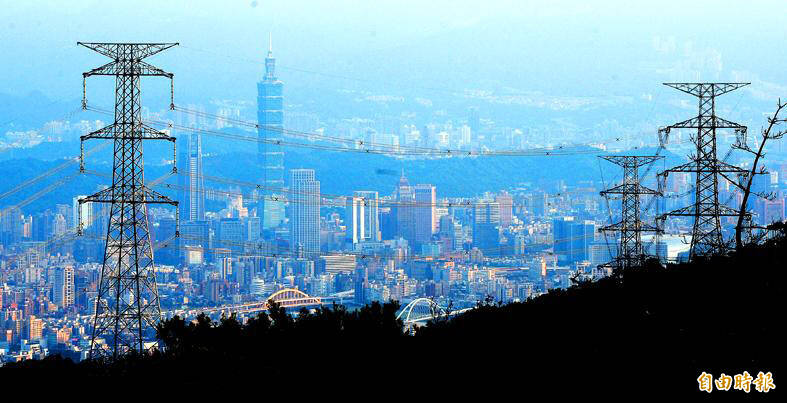《TAIPEI TIMES》 Nuclear engineer shortage an issue

Electricity pylons are pictured in Taipei in an undated photograph. Photo: Lin Cheng-kun, Taipei Times
By Chen Chia-yi and Jonathan Chin / Staff reporter, with staff writer
Academics and groups yesterday warned of the nation’s shortage of nuclear engineers.
Taiwan Power Co’s (Taipower) nuclear energy department employed 1,871 personnel, down 25 percentage points from the 2,529 employed in 2018, the state-owned enterprise’s latest data showed.
Yeh Tsung-kuang (葉宗洸), professor of engineering and systems science at National Tsing Hua University (NTHU), said the opponents of nuclear power should recognize that the dearth of technicians spell trouble for their plans to abolish atomic energy.
The nation’s remaining nuclear power plants would take 25 years to shutter completely, meaning Taipower would still need a supply of qualified technicians, he said.
Taiwan is heavily reliant on foreign experts to supervise the decommissioning of nuclear reactors as domestically trained engineers have limited experience in that task, Yeh said.
Foreign engineers unfamiliar with local conditions might suggest engineering solutions that Taiwanese staff are not equipped to implement, he added.
NTHU, a main source of nuclear engineers in Taiwan, produces only about 10 graduates in that field a year, with a majority of that number expected to seek employment in another country, Yeh said.
The government should invest in new nuclear energy technology such as fusion power if for no other reason than to make the discipline more attractive to prospective students, she said.
Green Citizens’ Action Alliance secretary-general Tsuei Su-hsin (崔愫欣) said there is an urgent need for the nation to obtain more nuclear technicians as even deactivated reactors require a large staff to maintain.
According to the Ministry of Economic Affairs’ data, the rise of the artificial intelligence (AI) industry is expected to increase national energy consumption by 3 percent.
Gloria Hsu (徐光蓉), a retired professor of atmospheric sciences at the National Taiwan University, urged the nation’s enterprises to make better use of energy-saving technologies to offset consumption.
Greenpeace East Asia climate and energy campaigner Lena Chang (張皪心) said the RE100 renewable energy initiative, of which Taiwan Semiconductor Manufacturing Co is a part, does not recognize nuclear power as a renewable energy.
The government should look into employing feed-in premiums or tax credits to incentivize the private sector to consume and invest in renewables, she said.
Ideally, enterprises should be encouraged to generate renewable energy for their own use, she added.
Higher energy efficiency standards, stronger regulations and incentives for research and development in energy-saving technology are among the policies Taipei might adopt to reduce carbon emissions, she added.
新聞來源:TAIPEI TIMES
















